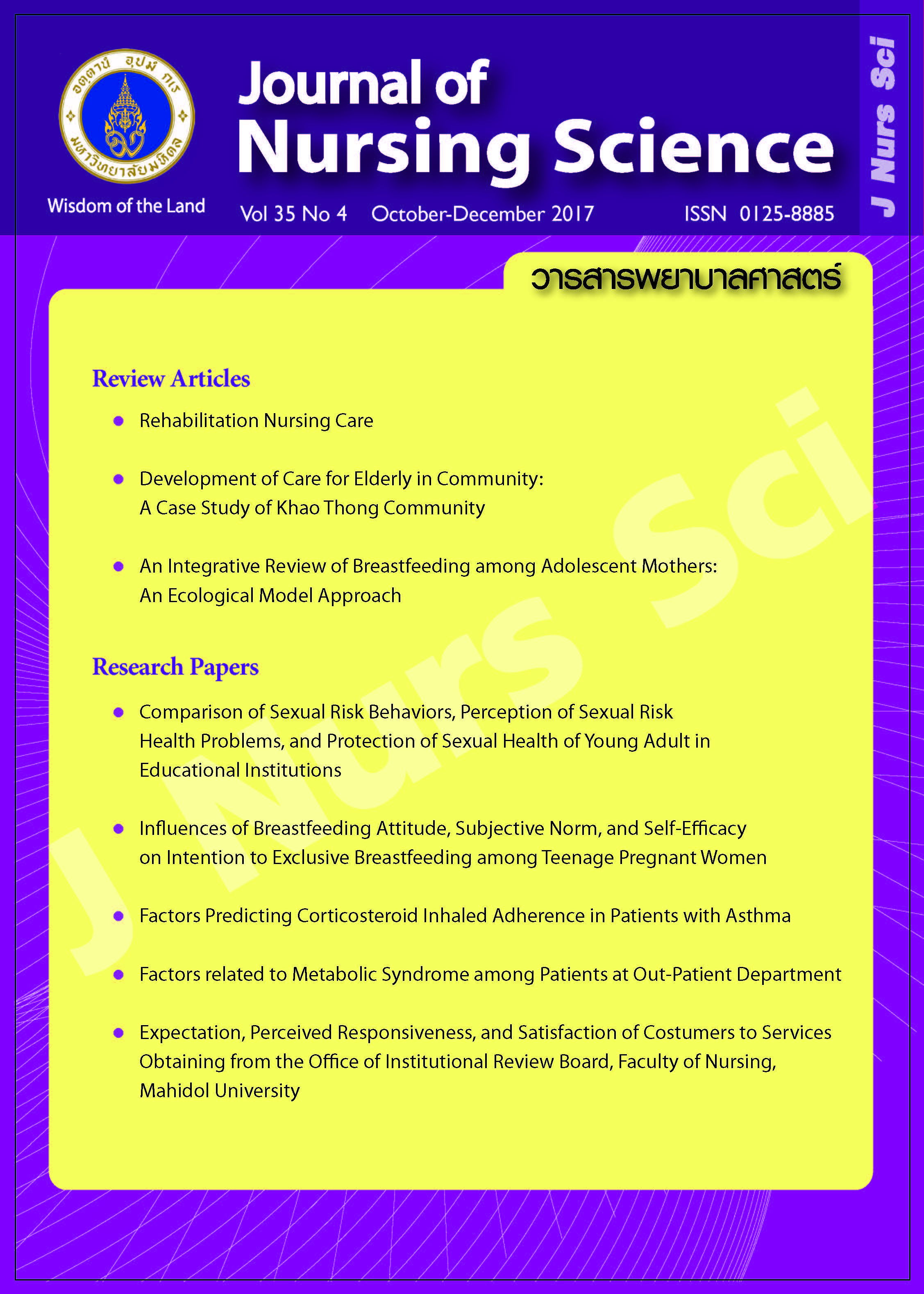Expectation, Perceived Responsiveness, and Satisfaction of Costumers to Services Obtaining from the Office of Institutional Review Board, Faculty of Nursing, Mahidol University ความคาดหวัง การได้รับการตอบสนอง และความพึงพอใจของผู้รับบริการต่อการบริการของสำนักงานคณะกรรมการจริยธรรมการวิจัยในคน คณะพยาบาลศาสตร์ มหาวิทยาลัยมหิดล
Main Article Content
Abstract
Purpose: To explore the expectation, perceived responsiveness, satisfaction, and additional needs of customers to services obtaining from the office of Institutional Review Board, Faculty of Nursing, Mahidol University (IRB-NS); and the relationship between the expectations, perceived responsiveness, and satisfaction of customers.
Design: Descriptive correlational design.
Methods: Data were collected from 71 customers who submitted the research protocols for approval from the IRB-NS since 2012-2015; using online questionnaires.
Main findings: The highest expectation service was the time period of consideration ( = 86.39, SD = 22.24). The highest of the perceived responsiveness service was the IRB-NS website (
= 85.45, SD = 22.53). The highest satisfaction service was the recommendation about administrative process from the IRB-NS staff (
= 89.32, SD = 18.91). The expectation was positively related to the perceived responsiveness and the perceived responsiveness was positively related to the satisfaction (rs = .700, .595, p < .01). The extra services that were equally needed by customers were the online submission and the personal consulting for revision followed by the committee’s comments at 69.0%.
Conclusion and recommendations: The service from the IRB-NS office should be in accordance with the customers’ expectation. The service for the time period of consideration should be improved. The IRB-NS office should arrange the extra services for revising the protocol until finished.
บทคัดย่อ
วัตถุประสงค์: เพื่อศึกษาความคาดหวัง การได้รับการตอบสนอง ความพึงพอใจ และความต้องการบริการเพิ่มเติม ของผู้รับบริการ และความสัมพันธ์ระหว่างความคาดหวังและการได้รับการตอบสนองกับความพึงพอใจของผู้รับบริการ จากสำนักงานคณะกรรมการจริยธรรมการวิจัยในคน คณะพยาบาลศาสตร์ มหาวิทยาลัยมหิดล
รูปแบบการวิจัย: การวิจัยเชิงพรรณาแบบสหสัมพันธ์
วิธีดำเนินการวิจัย: เก็บข้อมูลจากผู้รับบริการที่ขอรับการพิจารณารับรองโครงการวิจัยจากคณะกรรมการฯ ในปี พ.ศ. 2555-2557 จำนวน 71 คน (ร้อยละ 34.8) โดยแบบสอบถามออนไลน์
ผลการวิจัย: กิจกรรมการบริการที่ผู้รับบริการคาดหวังมากที่สุด ได้แก่ ระยะเวลาที่ผู้รับบริการทราบผลการพิจารณาในแต่ละกระบวนการฯ ( = 86.39, SD = 22.24) กิจกรรมการบริการที่ได้รับการตอบสนองมากที่สุด ได้แก่ เว็บไซต์ของสำนักงานฯ (
= 85.45, SD = 22.53) กิจกรรมการบริการที่ได้รับความพึงพอใจมากที่สุด ได้แก่ การให้คำแนะนำในด้านธุรการจากเจ้าหน้าที่สำนักงานฯ (
= 89.32, SD = 18.91) ทั้งนี้ ความคาดหวังมีความสัมพันธ์ทางบวกกับการได้รับการตอบสนองอย่างมีนัยสำคัญทางสถิติ และการได้รับการตอบสนองมีความสัมพันธ์ทางบวกกับความพึงพอใจอย่างมีนัยสำคัญทางสถิติ (rs = .700 และ .595 ตามลำดับ, p < .01) ส่วนกิจกรรมการบริการที่ผู้รับบริการต้องการให้เพิ่มเติมมากที่สุด คือ ระบบลงทะเบียนยื่นแบบเสนอโครงการฯ ผ่านช่องทางออนไลน์ และระบบการให้คำปรึกษารายบุคคลเกี่ยวกับแนวทางการปรับแก้ไขตามข้อเสนอแนะของคณะกรรมการฯ โดยมีสัดส่วนที่เท่ากัน คือ ร้อยละ 69.0
สรุปและข้อเสนอแนะ: การจัดบริการของสำนักงานฯ ควรเป็นไปตามความคาดหวังของผู้รับบริการ โดยควรปรับปรุงกิจกรรมการบริการในด้านระยะเวลาที่ผู้รับบริการทราบผลการพิจารณาในแต่ละกระบวนการฯ และควรจัดบริการให้คำปรึกษารายบุคคลเกี่ยวกับการเขียนแบบเสนอโครงการและแนวทางการปรับแก้ไขตามข้อเสนอแนะของคณะกรรมการฯ
Article Details
Copyright Notice: Nursing Science Journal of Thailand has exclusive rights to publish and distribute the manuscript and all contents therein. Without the journal’s permission, the dissemination of the manuscript in another journal or online, and the reproduction of the manuscript for non-educational purpose are prohibited.

Disclaimer: The opinion expressed and figures provided in this journal, NSJT, are the sole responsibility of the authors. The editorial board bears no responsibility in this regard.
References
2. Office of the Secretary, Department of Health, Education and Welfare. The Belmont report: ethical principles and guidelines for the protection of human subjects of research, report of the national commission for the protection of human subjects of biomedical and behavioral research. Fed Regist. 1979;44(76):23192-7.
3. Institutional Review Board; Mahidol University, Faculty of Nursing. Standard operating procedure of Institutional Review Board, Faculty of Nursing, Mahidol University (Version date 4 September 2013). Bangkok: Mahidol University; 2013. (in Thai).
4. Viphatphumiprathes T. Research ethics in social sciences. Journal of Humanities and Social Sciences Mahasarakham University. 2015;34(4):52-9. (in Thai).
5. Ashcraft MH, Krause JA, Social and behavioral researchers’ experiences with their IRBs. Ethics Behav. 2007;17(1):1-17. doi: 10.1080/10508420701309614.
6. Institutional Review Board; Mahidol University, Faculty of Nursing. Annual report of Institutional Review Board, Faculty of Nursing, Mahidol University in 2010-2014. Bangkok: Mahidol University; 2014. (in Thai).
7. Parasuraman A, Zeithaml VA. Berry LL. A conceptual model of service quality and its
implications for future research. J Marketing. 1985;49(4):41-50.
8. Lynn MR, Nelson DK. Common (mis)perceptions about IRB review of human subjects research. Nurs Sci Q. 2005;18(3):264-70.
9. Klitzman R. The ethics police?: IRBs’ views concerning their power. PLoS One. 2011;6(12):e28773. doi:10.1371/journal.pone.0028773. PubMed PMID: 22174893; PubMed Central PMCID: PMC3236766.
10. Whitney SN, Alcser K, Schneider C, McCullough LB, McGuire AL, Volk RJ. Principal investigator views of the IRB system. Int J Med Sci. 2008;5(2):68-72.
11. Ruangvittayanon C, Tooncharoen P, Subkha O, Prapuetpan S, Tikul J. Expectation and satisfaction of Customers on Services of the Center for Educational Services, Suranaree University of Technology. Sarakham Journal. 2015;6(2):1-23. (in Thai).
12. Nulty DD. The adequacy of response rates to online and paper surveys: what can be done? Assess Eval High Edu. 2008;33(3):301-14.
13. Benkarn P. A meta – analysis of factors affecting response rate to mailed questionnaires. Journal of Research Methodology. 1996;8(2):40-57. (in Thai).
14. Taweerat P. Research methodology in behavioral sciences and social sciences. 7th ed. Bangkok: Srinakharinwirot University; 1997. (in Thai).


